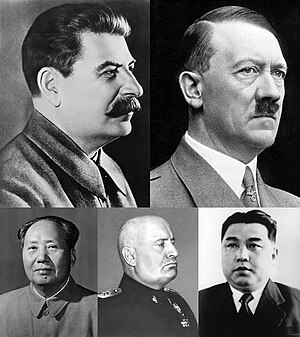Totalitarianism: Difference between revisions
imported>GAB168 Created page with "thumb|The most famous and notorius totalitarian dictators in human history. Joseph Stalin, Adolf Hitler, Mao Zedong, Benito Mussolini, and Kim Il-sung. '''Totalitarianism''' is a form of dictatorship in which control expands not only on the collectivity, but even on the individual. == Structure == The state is ruled by one single mass party who has a clear and specific ideology that it may comes from both the far-left and..." |
imported>GAB168 mNo edit summary |
||
| Line 1: | Line 1: | ||
[[File:Historical totalitarian leaders.jpg|thumb|The most famous and notorius totalitarian dictators in human history | [[File:Historical totalitarian leaders.jpg|thumb|The most famous and notorius totalitarian dictators in human history: Joseph Stalin, Adolf Hitler, Mao Zedong, Benito Mussolini, and Kim Il-sung.]] | ||
'''Totalitarianism''' is a form of [[dictatorship]] in which control expands not only on the collectivity, but even on the individual. | '''Totalitarianism''' is a form of [[dictatorship]] in which control expands not only on the collectivity, but even on the individual. | ||
Latest revision as of 18:50, 14 January 2023

Totalitarianism is a form of dictatorship in which control expands not only on the collectivity, but even on the individual.
Structure edit
The state is ruled by one single mass party who has a clear and specific ideology that it may comes from both the far-left and far-right and is a politically irresponsible oligarchy.
Characteristic edit
A totalitarian state has control over information and comunication and uses these things to psychologgically manipulate the individual through propaganda and brainwashing. Sometimes, it uses even the police or law enforcement organizations to control the individual.